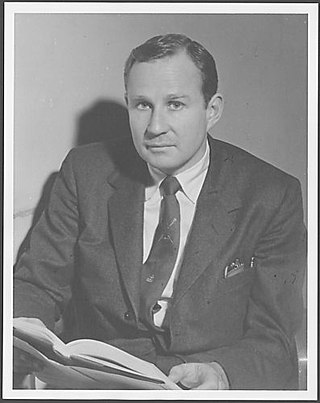Epistemology is the branch of philosophy concerned with knowledge. Epistemologists study the nature, origin, and scope of knowledge, epistemic justification, the rationality of belief, and various related issues. Debates in contemporary epistemology are generally clustered around four core areas:
Social epistemology refers to a broad set of approaches that can be taken in epistemology that construes human knowledge as a collective achievement. Another way of characterizing social epistemology is as the evaluation of the social dimensions of knowledge or information.
An online encyclopedia, also called an Internet encyclopedia, is a digital encyclopedia accessible through the Internet. Examples include Encarta from 2000 to 2009, Wikipedia since 2001, the Encyclopædia Britannica since 2016, and Encyclopedia.com since 1998.

Wilfrid Stalker Sellars was an American philosopher and prominent developer of critical realism, who "revolutionized both the content and the method of philosophy in the United States".

The Stanford Encyclopedia of Philosophy (SEP) is a freely available online philosophy resource published and maintained by Stanford University, encompassing both an online encyclopedia of philosophy and peer-reviewed original publication. Each entry is written and maintained by an expert in the field, including professors from many academic institutions worldwide. Authors contributing to the encyclopedia give Stanford University the permission to publish the articles, but retain the copyright to those articles.
Internet Infidels, Inc. is a Colorado Springs, Colorado-based nonprofit educational organization founded in 1995 by Jeffery Jay Lowder and Brett Lemoine. Its mission is to use the Internet to promote a view that supernatural forces or entities do not exist. Internet Infidels maintains a website of educational resources about agnosticism, atheism, freethought, humanism, secularism, and other nontheistic viewpoints particularly relevant to nonbelievers and skeptics of the paranormal. Relevant resources include rebuttals to arguments made by religious apologists and theistic philosophers, transcripts of debates between believers and nonbelievers, and responses from opponents of a naturalistic worldview. The site has been referred to by one of its critics, Christian apologist Gary Habermas, as "one of the Internet's main Web sites for skeptics", and by skeptical physicist Taner Edis as "a major Web site serving nonbelievers". Its tagline is "a drop of reason in a pool of confusion".
The linguistic turn was a major development in Western philosophy during the early 20th century, the most important characteristic of which is the focusing of philosophy primarily on the relations between language, language users, and the world.
John Kenneth Muir is an American literary critic. As of 2022, he has written thirty reference books in the fields of film and television, with a particular focus on the horror and science fiction genres.
Philosophy is the study of general and fundamental problems concerning matters such as existence, knowledge, values, reason, mind, and language. It is distinguished from other ways of addressing fundamental questions by being critical and generally systematic and by its reliance on rational argument. It involves logical analysis of language and clarification of the meaning of words and concepts.
Philosophers' Imprint is a refereed philosophy journal.

The American Catholic Philosophical Quarterly is a peer-reviewed academic journal sponsored by the American Catholic Philosophical Association. It was founded in 1927 as The New Scholasticism and adopted its current title in 1990. The journal publishes articles and book reviews covering the entire range and history of Western philosophical thought. Contributions on non-Western philosophy are also published, especially if they shed light upon issues in the Western tradition. The journal is not committed to any particular school of philosophy and contributions variously employ analytical, phenomenological, Thomistic, historical, and other methods. Nevertheless, it typically prefers contributions on topics or thinkers that are of special interest to Catholic thought. Thus, almost every issue usually carries at least one article on Thomas Aquinas. Pieces on medieval thought are well represented as well, as are essays in the philosophy of religion and philosophical theology.

PhilPapers is an interactive academic database of journal articles in philosophy. It is maintained by the Centre for Digital Philosophy at the University of Western Ontario, and as of 2022, it has "394,867 registered users, including the majority of professional philosophers and graduate students". The general editors are its founders, David Bourget and David Chalmers.

The Philosophy Documentation Center (PDC) is a non-profit publisher and resource center that provides access to scholarly materials in applied ethics, classics, philosophy, religious studies, and related disciplines. It publishes academic journals, conference proceedings, anthologies, and online research databases, often in cooperation with scholarly and professional associations. It also provides membership management and electronic publishing services, and hosts electronic journals, series, and other publications from several countries.
Noesis is a domain-specific search engine and open access journal for academic philosophy. The current online version is a prototype release. Noesis may be treated as a sort of clearinghouse for scholarly e-journals in philosophy.

Análisis Filosófico is a peer-reviewed biannual open access academic journal that publishes scholarly articles on theoretical and practical philosophy "in order to contribute to philosophical analysis development." The journal was established in 1981 as the official journal of the Argentine Society of Analytic Philosophy. The first editor-in-chief of Análisis Filosófico was the Argentine philosopher Eduardo Rabossi. It is available online through SciELO and is indexed in the Philosopher's Index.
James Fieser is professor of philosophy at the University of Tennessee at Martin. He received his B.A. from Berea College, and his M.A. and Ph.D. in philosophy from Purdue University. He is founder and general editor of the Internet Encyclopedia of Philosophy. He is author, coauthor or editor of more than ten text books. Fieser is also known for being the guitarist in the hit band Oxford Street Band.

Bradley Harris Dowden is an American philosopher and professor of philosophy at the California State University, Sacramento.






